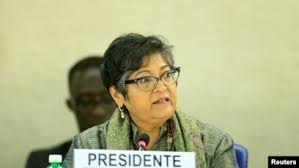The UN Commission on Human Rights in South Sudan has sounded the alarm that the 2018 Revitalized (Peace) Agreement is at serious risk of collapse and called for urgent, coordinated regional intervention to salvage the faltering peace process.
According to a Friday press release extended to this publication, the Commission stressed that escalating military offensives, political crackdowns, and foreign military presence are not only accelerating the breakdown of the Agreement but also fueling deep fear, instability, and widespread trauma among the people of South Sudan.
“South Sudan’s peace agreement is in crisis. The renewed violence is pushing the Revitalized Peace Agreement to the brink of irrelevance, threatening a total collapse. Such a breakdown risks fragmenting the country even further,” said Yasmin Sooka, Chair of the Commission. “Regional partners -especially the African Union and IGAD – must urgently increase their leverage and pressure on South Sudan’s leaders to de-escalate tensions, return to meaningful dialogue, and fully implement the peace agreement. It remains the only credible pathway to stability, peace, and democratic transition.”
Earlier this week, the Commission held consultative dialogues with a range of stakeholders, including civil society representatives, to assess the deepening crisis and explore measures to avert a return to civil war. Participants expressed widespread fear and anxiety among communities, who are increasingly traumatized by persistent violence, arbitrary arrests, and the erosion of civic space.
“Since March 2025, the South Sudan People’s Defense Forces (SSPDF) have launched sustained military operations, including airstrikes on civilian-populated areas, causing significant casualties and mass displacement,” the statement reads in part.
A state of emergency has been declared in several regions where operations continue. Reports of Ugandan forces supporting the SSPDF, alongside the government’s move to recruit thousands of additional soldiers – seemingly outside the security sector reform commitments in the Revitalized Agreement and pointing towards protracted conflict – have further heightened public fear and concern over looming widespread violations.
“South Sudanese are living with extreme trauma. They are enduring targeted military attacks that have upended lives and instilled widespread fear,” said Commissioner Carlos Castresana Fernández. “The ongoing recruitment drive by the SSPDF directly contradicts the Revitalized Agreement, which calls for the training and deployment of the Necessary Unified Forces. The country’s leaders – signatories of the Agreement – must abandon partisan agendas and act in the interest of the people.”
“The world cannot remain as bystander while civilians are bombed, and opposition voices are silenced. The time for passive diplomacy is over – these senseless attacks must stop,” he stressed.
Political tensions in South Sudan have sharply escalated with the arbitrary detention of key opposition figures, including the First Vice President, Dr. Riek Machar, alongside expanded military operations by the SSPDF, including in populated civilian areas, and against armed opposition forces and groups. Escalating armed violence has deepened South Sudan’s humanitarian and human rights crises. Civilians in Upper Nile State have been particularly affected, as the region, already grappling with emergency-level food insecurity, has become a key transit corridor for refugees fleeing the conflict in Sudan. Fears are growing that if this conflict trajectory is not averted, South Sudan’s conflict will entwine with the crisis of Sudan, with even more dire consequences.
“Salvaging South Sudan’s peace agreement should be of utmost priority in an already turbulent region, as the agreement enables political adversaries to partner towards a transformative transition in this country,” said Commissioner Barney Afako. “Torpedoing the transition is an act of profound folly and recklessness that is already reigniting violence, deepening insecurity, and imposing further grave violations on long-suffering citizens, and undermining regional peace architectures.”
“Regional partners and peace guarantors must not indulge these damaging machinations; rather, they should resolve to urgently restore a credible transition that will deliver citizens’ aspirations for durable peace and justice,” he urged.
The Commission reiterated its call for regional and international actors to intensify diplomatic pressure on South Sudan’s leaders to ensure immediate de-escalation and full implementation of the Revitalized Agreement. Commissioner Yasmin Sooka also noted that “any unilateral attempts to derail the transition and undermine regional peace architectures have grave implications for peace and security in the Horn of Africa, and that failure to act could plunge the country into another devastating cycle of conflict.”
“The Commission continues to monitor developments closely and is documenting human rights violations and abuses committed by all parties to the conflict, including those potentially amounting to war crimes,” the statement concluded.




